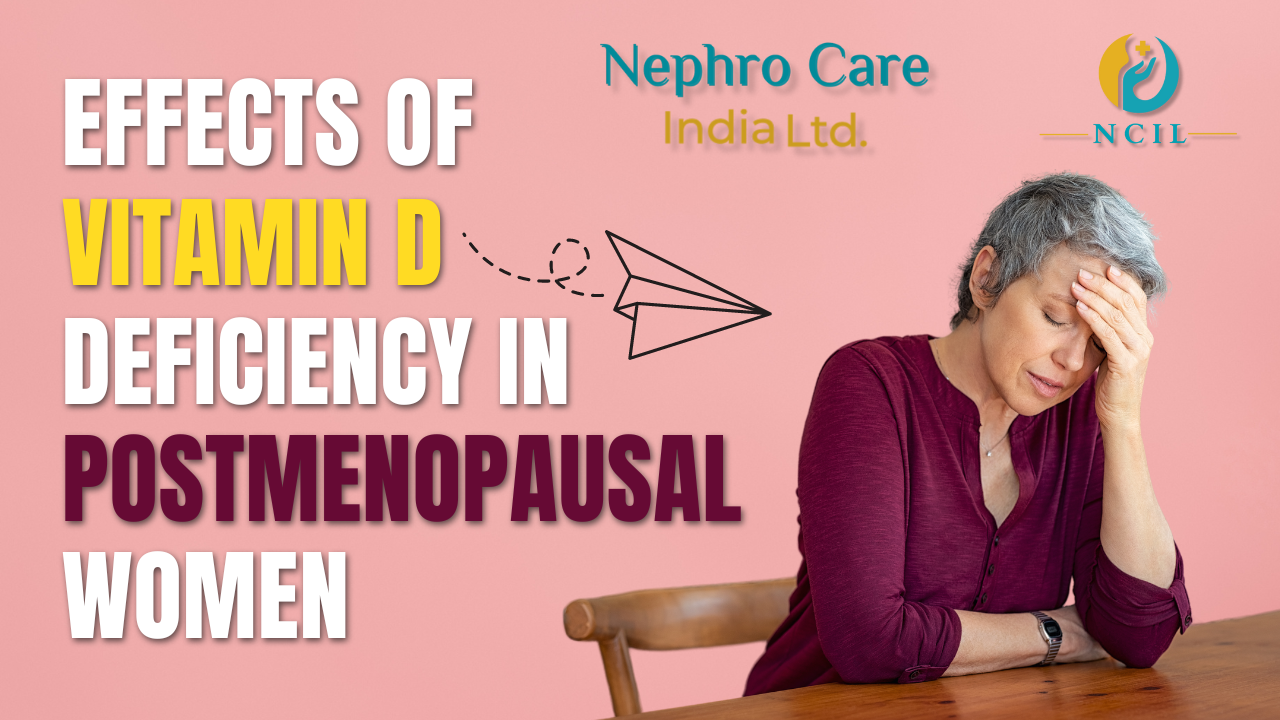Vitamin D Deficiency in Postmenopausal Women
As women navigate the changes of menopause, they encounter a variety of health concerns. Among these, Vitamin D deficiency is a particularly significant issue that can affect overall health and contribute to osteoporosis, characterized by weakened bones and a higher risk of fractures. This blog explores the critical importance of Vitamin D for postmenopausal women, the dangers of deficiency, and effective strategies for maintaining adequate Vitamin D levels.
The Importance of Vitamin D for Postmenopausal Women
Vitamin D is crucial for the body, primarily because it facilitates calcium absorption, which is essential for bone health. During menopause, estrogen levels decrease, fast-tracking bone loss and increasing the need for sufficient Vitamin D to help mitigate the risk of osteoporosis and fractures.
Consequences of Vitamin D Deficiency
For postmenopausal women, a lack of Vitamin D can lead to several health issues:
- Bone Health: Without enough Vitamin D, calcium absorption decreases, resulting in weaker bones and a higher risk of osteoporosis. This condition makes bones fragile and more susceptible to fractures from minor falls or injuries.
2. Muscle Function: Vitamin D deficiency can weaken muscles, increasing the likelihood of falls and injuries. Strong muscles are vital for maintaining balance and preventing falls, which is crucial for avoiding fractures in older women.
3. General Health: Vitamin D also involves various bodily functions, including immune system support and inflammation control. Deficiency can negatively impact overall health and increase the risk of chronic diseases (Chirumbolo et al., 2017).
Causes of Vitamin D Deficiency
Several factors can lead to Vitamin D deficiency in postmenopausal women:
- Limited Sun Exposure: Less exposure can lead to deficiency since the body produces Vitamin D when exposed to sunlight.
- Aging Skin: Older skin becomes less efficient at synthesizing Vitamin D from sunlight.
- Dietary Intake: Many older adults do not consume sufficient Vitamin D-rich foods, such as fatty fish, fortified milk, and eggs.
- Medical Conditions: Certain health conditions and medications can interfere with the absorption and metabolism of Vitamin D.
Strategies to Prevent Deficiency
Preventing Vitamin D deficiency involves a mix of lifestyle changes, dietary adjustments, and, when necessary, supplementation.
- Sunlight Exposure: Make sure it is as warm as possible, preferably when the sun is at its highest, which would be mid-day. This is because 10 to 30 minutes of sunshine in a day without applying sunscreen lotion is good for the production of Vitamin D especially for people with light skin.
- Dietary Sources: Integrate foods such as fish with a high level of Vitamin D. A lot of omega-3 fatty acids foods include fatty fish like salmon mackerel and tuna. Furthermore, there are foods enriched with calcium such as milk, orange juice and some cereal products.
- To know more about the appropriate diet, you can join our diet team and click below
- Supplementation: Insufficient sunlight and improper dieting can be combated by Vitamin D supplements to cure the former. It is also important to consult with a healthcare provider to determine the right dosage suitable for their cases. Consult our Yoga team for further inquiry at +91 8017041315.
- Regular Exercise: Engage in exercise regularly including those that impose body weight like walking, jogging or lifting weights. People also know that exercise is an important part of a healthy lifestyle, which may help prevent bone loss and decrease the chances of falling.
Conclusion
Vitamin D deficiency is a critical concern for postmenopausal women due to its essential role in bone health and overall well-being. Understanding the importance of Vitamin D and taking proactive measures to maintain adequate levels through sunlight exposure, diet, and supplementation can help protect against the risks of osteoporosis and other health issues. Regular check-ups with healthcare providers to monitor Vitamin D levels and bone health are also vital for ensuring a healthy and active life after menopause.
To read more about Vitamin D deficiency click the blog below
Reference
- Chirumbolo, S., Bjørklund, G., Sboarina, A. and Vella, A. The Role of Vitamin D in the Immune System as a Pro-survival Molecule Clinical Therapeutics/Volume 39, Number 5, 2017.





